Long Posts
- Draw
- Paint
- Close my eyes outside
- Read books
- Sew
- Borrow books from the library
- Go to parks
- Fall asleep away from the glow of my phone
- Read in hammocks
- Share quotes from what I’m reading.
- Read lots of books in a variety of formats & genres, but come back home to fantasy frequently.
- Talk to other people about what we’re reading & what else we might want to read.
- Read & write fanfic, especially for sitcoms and Star Trek: The Next Generation.
- Read a lot of interesting articles.
- Re-read Austin Kleon’s books.
- Blog about my experiences with chronic illness.
- Blog about my research.
- Gather references for a cosplay but don’t make it yet.
- Watch holiday rom-coms.
- Watch Star Trek.
- Introduce my kid to older kids TV.
- Blog about what I’m watching.
- Think about cool possibilities for the web, mostly late at night.
- Take occasional breaks from social stuff.
- Blog posts (including short notes)
- Emails
- Texts
- Slack messages
- Meeting agendas
- Comments on other people’s documents
- Forum posts
- Theory and methods
- Literature reviews
- searching for literature
- reading other people’s literature reviews
- managing literature
- writing literature reviews
- Peer review
- Project management
- Research ethics
- Diversity, equity, and inclusion
- Presenting orally
- Empirical research methods
- Collaborative & interdisciplinary work
- Creating posters
- Writing research proposals
- Grants and funding
- Data management
- Writing referred papers
- Metrics
- Julie Stivers, middle school librarian at Mt. Vernon Middle School in Raleigh, NC
- Miles, a rising high school junior and former student of Julie’s
- Kym Powe, Children and YA Consultant, Connecticut State Library
- Juan Rubio, Digital Media and Learning Program Manager, Seattle Public Library
- Sandra Hughes-Hassell, Professor at the University of North Carolina at Chapel Hill School of Information and Library Science
- Hold onto why you do the work.
- Recognize structural aspects of fostering equity and inclusion and simultaneously equip library staff to take individual action.
- Center the voices and experiences of youth themselves.
- Attend events like the Connected Learning Summit.
- Look for free professional development like Project READY.
- Talk to your state library.
- YALSA Article describing #LibFive
- Images of Practice: #LibFive at Mount Vernon Middle School (featuring youth researchers!)
- #LibFive Infographic
- VRtality website
- Article in American Libraries about VRtality
- “From Safe Spaces to Brave Spaces”
- Project READY: Reimagining Equity & Access for Diverse Youth
- GELS: Growing Equitable Library Services
- Equity Literacy Institute
- Project ENABLE (one of the models for Project READY!)
- WebJunction
- Radical Hospitality
- Racial Equity Institute
- EmbraceRace
- Elaborate on places where I cited multiple sources and be more explicit about what they say and how they’re in conversation with one another. (This is a very reasonable suggestion, and the one I’ve been working on this whole time.)
- Completely re-organize the literature review based on insights hinted at in the conclusion.
- VAGUELY CONTRADICTORY SUGGESTIONS FROM THE SAME REVIEWER: broaden the scope to include more scholarly research; narrow the scope to focus on only one of three areas addressed in the lit review.
- Find criticism that contrasted with the positive sources cited and described in the paper. (There wasn’t enough literature for that to really be a thing.)
- Completely restructure the paper based on one of the developmental frameworks I drew on.
- Teen library programming should support teens’ identity development.
- Teen library programming around TRPGs should go beyond the idea of engagement and actually reach a level of impact where teens get to try on new personas, take imaginary risks, and figure out their own moral beliefs through pretending to be other people.
- Use it as the foundation for some public writing. If you know of an outlet where a paper about how TRPGs support identity development would be a good fit, please let me know.
- I’m going to pocket it to support some original research, if I end up in a situation to actually collect data on the relationship between TRPGs and identity development.
Moderating my own smartphone use (but still not belonging in the Luddite club)
I thought, given my heavy criticism of the potential perspective that we should all join the Luddite club, it might be useful to discuss my own smartphone use and the steps I take to moderate it.
Let me start by saying that I know in the case of addictive behavior, moderation is sometimes not an option. I have no objection to people recognizing that they are in this situation and opting out of smartphone use, or potentially any Internet use at all. You’ve got to do what’s right for you.
My objection is to people who might suggest that what’s right for the Luddite club is right for everyone with a smartphone.
Don’t want a smartphone? Cool! Get rid of yours if you have one! Never get one if you don’t!
I myself vacillate wildly between intense use to the point of it disturbing my sleep (not good, obvs) and more instrumental use that is less disruptive to the rest of my life.
When I start to notice intense use - or when something like the Luddite club article prompts me to consider my own use - there are a few techniques I rely on to curb my use and help me moderate.
For a long time, my default was to work my way through this Better Humans article, Configure Your iPhone to Work for You, Not Against You. It links an Android version at the end, but the principles work for any smartphone, regardless of OS. This is a time consuming process and actually in the name of habit change and productivity involves adding apps I almost never use, so I have stopped going through the full process. I’ll sometimes Google around for other ideas about turning smartphones into tools (as opposed to toys or distraction), and use what I learn in those, too.
Here are the things I do, divided into almost always and sometimes categories.
Almost always
Turn off almost all notifications. I get notifications for calls, texts, and maps. That’s it. Corollary: I almost always have my phone on vibrate or silent, so even those notifications don’t disturb me.
Avoid social media apps. As much as possible, if I’m going to use social media, I do it through the browser. Occasionally I’ll need a feature like putting up a story on Instagram when I was on the UC Irvine Strike Solidarity Team’s Social Media Team and was contributing to that Instagram account. But I usually uninstall pretty rapidly after that.
Turn on Do Not Disturb. I’m in Do Not Disturb mode, with only starred contacts allowed through, unless I’m expecting a call from someone who isn’t a starred contact (like my doctor or a contractor who’s coming to work on the house). Starred contacts include family members and my kid’s school. That’s it.
Use no wallpaper + a black background OR Austin Kleon’s Read a Book Instead wallpaper. Pretty self-explanatory.
Turn off Raise to Wake. I have to push a button to turn my phone on and put in a code to see anything on it. (I just switched from a swipe to a numerical code in order to add a little more friction.)
Use bedtime mode at night. Most of the time, I have the phone in black and white with even more notifications blocked than usual, between 7:30 pm and 7:30 am. If I’m up in the night and want to watch something or play something on my phone, I try to leave bedtime mode on and do it in black and white. This only helps some, though.
Sometimes
Use Firefox Focus as my browser. When I’m getting way too deep into Internet rabbit holes, which I usually do in Chrome, I disable Chrome and switch to Firefox Focus. It doesn’t remember my log-ins, so I have to log in to each site I visit every time I visit it. It doesn’t keep a history, so I have to either search for or manually type in URLs. Sometimes, I need the affordances of Chrome, and I switch it back on. I haven’t figured out how to copy and paste in Focus yet.
Remove everything from my home screen. I usually have a pretty sparse home screen, but sometimes I remove everything from it. I’m not sure this is very effective though because then I tend to pull up the app drawer and scroll through all the apps, including some distracting ones like the browser, to get to the thing I want. So sometimes I’m more strategic and drop my most frequently used useful apps, like Google Keep and anything related to books or podcasts, on my home screen.
Use bedtime mode all day. Having the phone be in black and white makes it less appealing.
In the future
I still am in the bad habit of checking my phone first thing in the morning, last thing before bed, and any time I get up in the night. So I’ll be working on that.
Maybe we don't all need to join the Luddite club.
I have some thoughts about the Luddite club.
First, I don’t have a problem with people switching to flip phones. I do have a problem with the implication it makes them morally superior to people who use smartphones.
I think one of my biggest problems with the article is the feel of the writing: a sense of awe, a focus on fashion, a vibe that reads to me like “Ooh isn’t it amazing that these kids wear Doc Martens and read books?”
I fully support the desire to break free of slot machine dopamine hit features of social media. But here are activities that, in the article, read as though they require giving up your smartphone but that I, a person with a smartphone, sometimes do:
I’m glad teens do these things. And if they can only do them without smartphones, okay. But let’s not act like these activities are inaccessible to people with smartphones.
One of the most concerning things is the veneration these kids seem to feel for Chris McCandless. One of them says, “…that guy was experiencing life. Real life.” But actually, what he experienced was death. This dude might have been sympathetic but I know I don’t want my kid holding him up as a role model. If you’re going to go off the grid, learn how to take care of yourself BEFORE you get there.
I’m also not convinced that this is the beginning of a social movement. The founder of the club was discouraged when people suggested it was classist, but she says, “[my advisor] told me most revolutions actually start with people from industrious backgrounds, like Che Guevara.” I think the word we might be looking for here rather than “industrious” is “privileged,” “middle class,” “bourgeois,” or “capitalist.” But also, Che Guevara was motivated by witnessing other people’s misery and took action directed at alleviating it. I hope Luddite club kids use some of their screen-free time to benefit others. The article doesn’t make it clear whether they do, so I don’t know how apt the comparison to Guevara is.
Meg Pillow pointed out that for some of us, social media has been a great way to expand our awareness beyond our own experiences, to escape a filter bubble. One of the kids quoted in the article said, “Being in this club reminds me we’re all living on a floating rock and that it’s all going to be OK.” But when I read this, it made me think that without some other way of learning about the world, this is simple escapism. Are the Luddite club kids listening to the radio? Reading independent newspapers? Watching public television? How do they learn about the world beyond their schools and club, about the world that’s not printed about in classic or mainstream printed texts?
The most honest part of the article seemed to me to be when the founder of the club said that she likes that her parents are addicted to their smartphones, “because I get to feel a little superior to them.” This is developmentally right on track for a high school senior. I’m pretty sure these kids in the Luddite club will be fine. But I think we adults need to look a little deeper at what’s going on before deciding we should model our own lives on theirs or pressure our kids to do likewise.
'Wednesday' is full of "Whoa." 📺
I just finished the first episode of Wednesday. I have so many thoughts and feelings.
First, I’ve seen criticism that the Addams Family works best when you have the whole family. (Sadly, I can’t find the link to where I read this right now.) I completely agree but the decision to rely on the trope of a teen rebelling against their parents means any family time here is very tense. So I don’t want the whole family together because they’re not as loving as I’m used to.
As Emmet Asher-Perrin points out, the Addams Family movies are all about family as a safe haven, on the unconditional not just love, but positive regard they have for their children. That vibe isn’t present here.
(I’ll mention at this point that I haven’t seen the recent animated Addams Family movies, and that I shunned the musical because a huge part of the premise was Wednesday wanting to be normal for a boy and that’s just… not very Wednesday.)
But.
Jenna Ortega is brilliant. She perfectly revives My Generation’s Wednesday (what’s my generation? Xennials I guess?). Her delivery is beautiful. Her physicality is on point (🤺).
I really appreciate the Christina Ricci cameo. She’s adorable.
I love how this feels like a goth Veronica Mars. I’ve seen comparisons to Riverdale, but at least in the first season, Jughead’s narration is reportage, not reflection. He is wryly commenting on the corruption in his town. In contrast, Veronica and Wednesday give us interiority that isn’t self-indulgent.
It has me thinking about what bell hooks has to say about confessional writing, how perception of it is gendered. I’ve been reading remembered rapture lately.
I can’t deal with the family tension and all of the school bits are sort of… just being the cliche rather than commenting on it?
We’ve seen this roommate dynamic in Wicked (I may have started singing “Loathing” to myself when Wednesday and Enid met). There doesn’t seem to be a new take on it here.
Also: the embrace of the supernatural beyond the Addams’s immediate circle feels a little off to me here. In Charles Addams’s comics and in the 90s movies, the world was pretty normal. To suddenly have a school full of vampires, werewolves, gorgons, and sirens feels not exactly random, but out of place.
On this note: Thing. Thing has scars, Frankenstein’s creature style, and I don’t love it. I think because a disembodied hand is enough weird. It requires no additional weird.
The costumes are wonderful. The exterior view of the school makes me super happy.
I’ll give it a few more episodes but giving the Addams Family the Riverdale treatment with a Harry Potter setting, Doyle/Cordelia-on-Angel visions, and a more-Veronica Mars-than-Jughead voiceover feels mostly like trying to do too many things at one time.
(Also, I’ve seen comparisons to Nancy Drew, Buffy, and Sabrina the Teenage Witch but none to VMars, which feels super weird to me.)
How to feel like myself
My kid’s best friend’s mom got a new job and isn’t starting it until January, but has already left her old job. She has all of December to just be, with her kid in school for the first two weeks.
I told her that sounded amazing.
She said, “I feel like… I feel like myself. I was going to say I feel like a whole new person, but really I feel like myself.”
I said, “I want to feel like myself. I’ve gotta figure out how to do that.”
2022 feels like a year that was stolen from my whole family of origin, thanks to my mom’s leukemia and paraplegia. My mom has obviously had an incredibly hard year. My dad is learning what it is to be a primary caregiver at almost 70 years old and it’s a very different life than he’s ever known before. My brother has gone from being cared for to needing to give care to. My sister and I have both experienced frequent chronic illness flares.
In the spring, I resented the flowers for blooming. Didn’t they know my mom had leukemia? I didn’t do any of my normal springtime stuff.
In the summer, I made a whole plan to achieve summer vibes, but I only really did it halfheartedly.
In the fall, my mom was in the ER about once a week, with an extended hospital stay due to the cognitive effects of a medication reaction. Halloween was fun but I didn’t appreciate the gorgeous weather nearly enough.
And now Winter Is Coming 🐺, and I am realizing for the first time that I have always been A Christmas Person, but when we were decorating our tree I suddenly got very grouchy. Because of how different this year is and will be.
This is not just me sharing the bad — it’s me elucidating the things that have made me feel Not Me.
In a very Me move, to figure out what feels like me I went to my blog archives to see how I was coping in year 2 of the pandemic, before my mom got leukemia.
How to Feel Like Myself
Books & Reading
Health & Wellness
Work
Crafting
TV & Movies
The Internet
Uh oh, I’m doing me things and I still don’t feel like myself
I’m reading, especially fantasy. I’m watching holiday rom-coms and Star Trek. I introduced my kid to Wishbone 🐶. Why don’t I feel like myself?
The Missing Piece
I’m not reflecting, blogging, and talking to people. Metacognition is key to Kimberlying and I have let it get away from me. Time to get back to it.
My Reading Year, 2022 📚
Everybody is doing their year-end stuff, so I thought I’d do mine.
I read 46 books this year including comics/graphic novels and poetry. About 12 of those were graphic novels or poetry and another 2 or 3 were short story or novella collections. This puts me right about where my usual average for longer works is, around 30 books. I don’t set quantitative reading goals anymore besides reading one more book than I’ve read so far in a given year.
My reading this year was heavily influenced by the microgenres/aesthetics of cozy fantasy, adventurecore, and woodland goth.
I sought out cozy fantasy and adventurecore in particular because I wanted my reading to comfort me.
I joined the Atlas Obscura book club on Literati, because Austin Kleon stopped running his book club. I only finished two of the 5 books I got, but I look forward to finishing the ones I didn’t. I love the curation but the monthly format doesn’t really work for me and I wasn’t making the kinds of connections to other readers that I’d hoped to.
I started to list my favorite books I’ve read this year but the list got too long. I loved the Hildafolk series and The Bloody Chamber.
I began the year with the intention to get caught up on Leigh Bardugo’s backlist, and I only have one book to go, The Rule of Wolves. I started that this week, so I hope to finish before the year is out and be caught up just in time for the release of the new Alex Stern book.
I think that’s all I have to share about my reading this year. How did your reading year go?
The lyrics from Disney's Disenchanted that make me sob. 🎵
Spoilers for lyrics from Disenchanted follow. Without context they only mean a little but if you’re avoiding spoilers, just move along…
.
.
.
.
.
.
.
.
.
.
.
.
.
.
Are you ready to be spoiled?
.
.
.
.
.
.
.
It’s how I’d make a world for you
That never breaks your heart
Where you can grow and thrive
And your every wish can flower
I will always love you, Morgan
I’m so proud of how I know you’ll carry on
I’ve known a lot of magic in my life
But never anything as strong
Love power
My love for you has power
And you’ll have it there inside you
When I’m gone
These lyrics make me sob as a mother AND as a daughter because of course this is what I want for my kid but the “When I’m gone” part hits extra hard when your mom has leukemia and chemo/TKI complications you know?
This is a big cry I’ve been saving up since January as I kept it together for everybody else.
Okay, time for me to go strike now.
A letter to my past self circa 1997
Dear Kimberly,
I’m just going to jump right in.
Remember E’s cute boyfriend and how you noticed she seems to not be dating him anymore and you think that’s kinda sad? Don’t be sad. YOU’RE MARRIED TO HIM NOW. I mean, you’ll marry him in 2009.
You’ll have a beautiful kid with him in 2016. The kid has long eyelashes and says delightful things. You had him later than you expected but he’s worth the wait, I promise.
Hey guess what neighborhood you live in starting in 2011? W! That’s where rich people live, you say? Well, two things: 1. It’s actually where a broad range of middle class people live and 2. you definitely would think of the household you live in by 2022 as rich. Y’all could eat Lunchables and Fruit Roll-ups and drink Capri Sun Every Day if you wanted to. (But you won’t, it would create way too much trash.)
You have a PhD (2021) and your job is to read, write, and talk to librarians. ON THE INTERNET. I know, right? Pretty sweet gig.
There’s a lot of scary stuff going on in the world right now (2022) - global health stuff, political stuff, war stuff, climate change stuff (that’s what we call global warming right now because it’s more accurate). Also, some family illness stuff. I know that doesn’t feel new, and it’s not, but it’s still a lot.
And yet in spite of those difficulties, on the micro level, your life is AMAZING.
Just wanted to let you know.
Love, Kimberly
What feels like your people?
I have a lot of friends, but the circle of friends I think of as my people is much smaller. If I make a list, it’s probably maybe 10 or so people right now, though the circle has porous boundaries.
This morning I sent something Austin Kleon wrote to a friend with the note “This seems like something you’d appreciate.” Sometimes my friends send me things that remind them of me.
Sometimes there’s an obvious reason, like when anyone sends my sister red panda stuff or me mermaid things.
But my favorite times are when it’s about a vibe. That feels to me like accessing the ineffable core of a relationship that I always imagine you can only get at after a very intense initial period of friendship, unless you happen to be friends with a literal horse, in which case it happens instantly because horses just understand you.
There’s a sort of distance that I think makes this kind of thing easier. My dearest friends all live far away. I think it facilitates finding this kind of thing. I want to be in the lookout for more opportunities to do it for my most inner circle, my innest circle? My spouse, my child, my household of origin.
Do your people have vibes that give you shortcuts to letting them know you’re thinking of them?
Maybe not 50K words of literally anything...
It turns out giving yourself credit for everything you write is actually really challenging because you have to pull it all together somewhere, and sometimes you lose track of the last thing you counted.
It’s far too early to give up on NaNoWriMo.
But have y’all noticed that November is a really hard time to write in the Northern hemisphere? There’s the time change. The lack of light because of it. If you’re in the US, Thanksgiving eats up fully 5 days it feels like. (That’s 17% of your writing time!) At least it does in my family.
It’s just a brutal time!
This is why I like Camp NaNoWriMo. Especially July. July, if you work in education and can afford to send your kid to camp, is a great time to write.
Anyway. I’m not giving up on NaNo but I’m also not trying to do word counts on all my texts.
The only time I won NaNo, I wrote 25K words on November 30.
I’ve won Camp NaNo a few times with smaller goals.
I do want to write. I don’t know what a good writing goal, process, or practice looks like for me. Maybe I’ll take the rest of this month to figure it out.
NaNoWriMo pivot: Back to 50,000 words of literally anything at all
Hello friends!
It’s been slow-going working on my TNG fanfic. Early in October, I toyed with the idea of being a NaNo Rebel with the goal of writing 50,000 words of literally anything at all. At the time, I meant fanfic, original fic, and academic writing.
But at 4 AM this morning, I decided to return to that, with a much more expansive definition of “literally anything at all.”
Here are the things I’ve added to my word count so far:
And once I log back into social media tomorrow (I’m posting this via micropub), I’m going to add replies and quote tweets.
Why am I being so generous to myself with this definition?
A lot of the time, I use a goal like NaNoWriMo to prove to myself that I “can* write.
But lately, I’ve felt not that I have writer’s block, exactly, but that I’m just at a moment in life when writing is beyond my current capacity, that I just don’t have the bandwidth to write at present.
So I’m using this expansive definition to prove to myself that I do write, that I an writing, even when I feel like I can’t.
How’s NaNo going for you? Can you find a way to be more generous with yourself this month?
📚🍳Marinated Beans with Crunchy Veggies from I Dream of Dinner (So You Don't Have To)
Cooking is really hard with chronic illness, because both pain and fatigue reduce your options for homemade food that won’t eat up all your energy for the day.
When Suzanne Scott mentioned the cookbook I Dream of Dinner (So You Don’t Have To) at the Fan Cultures/Food Cultures session at FSN North America, citing the ease of prepping its recipes when you’re exhausted, I immediately put it on hold at the library.
I picked it up over the weekend. Today I made my first recipe in it: Marinated Beans with Crunchy Veggies. TL; DR: It’s tasty and I still had energy left after making it.
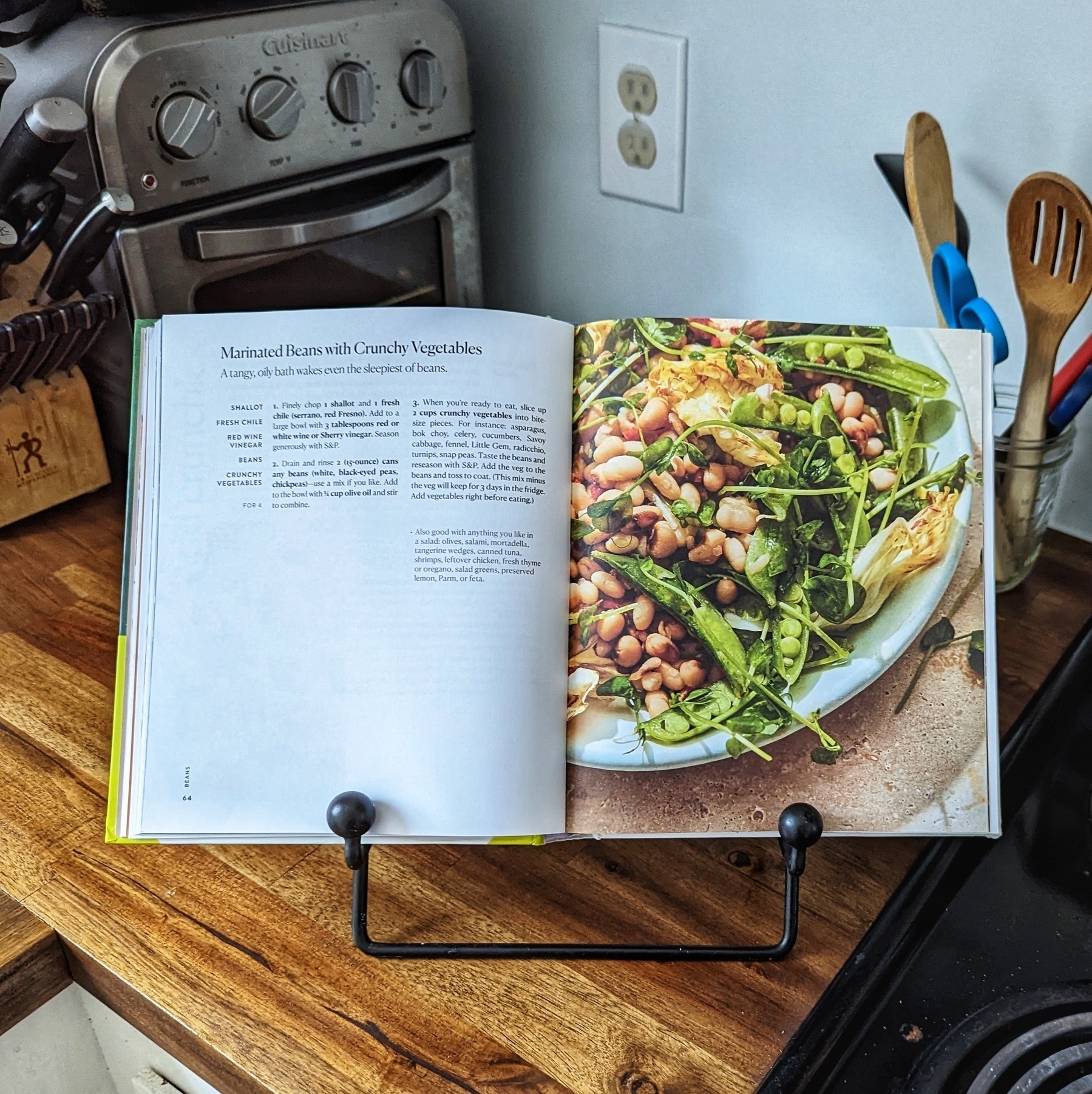
Right away the book delighted me by including all prep work in the written instructions rather than ingredients. Author Ali Slagle doesn’t say “Fresh shallot, finely chopped” in the ingredients list. Instead, it’s the first step in the recipe. Slagle also encourages substitutions.
I modified the recipe a bit to make it even friendlier for my chronically-ill self. Here are some photos with explanations.
The first change is that I subbed garlic powder in for chopped shallot. Target didn’t have shallots and I didn’t want to go to another store. Plus, I already had garlic powder on hand.
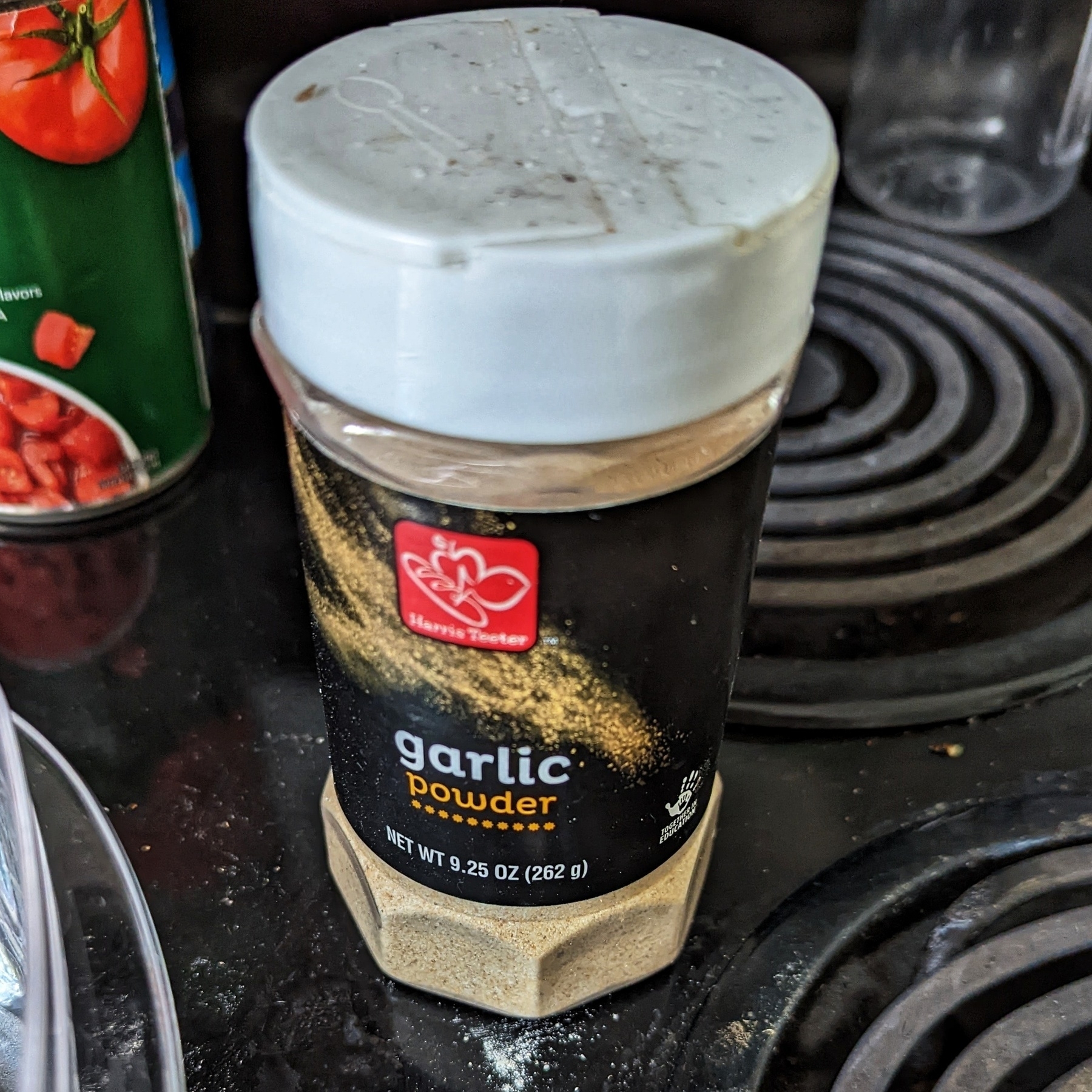
The second change is that I used canned diced green chiles instead of chopped fresh chile. I’m a spice wimp and once again Target had limited selection.
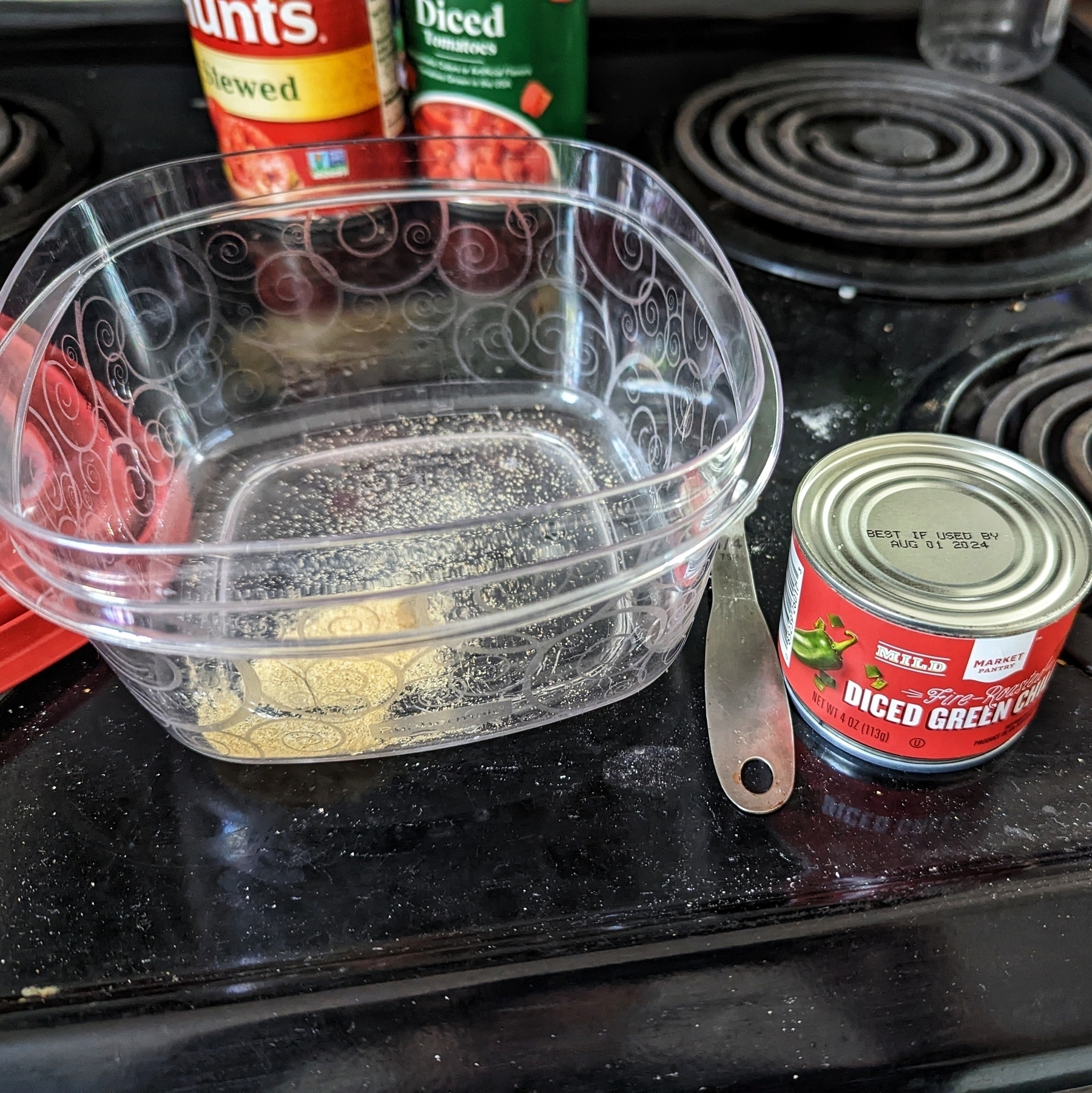
I then followed the recipe as written, using canned black beans, salt and pepper, red wine vinegar, and olive oil.
Slagle suggests chopping and adding veggies right before serving but I wanted to do that in advance, so I sliced celery and cucumber and stored them in a Mason jar to keep them crisp until serving time. They’ll only keep in the fridge for 3 or 4 days, but so will the beans.
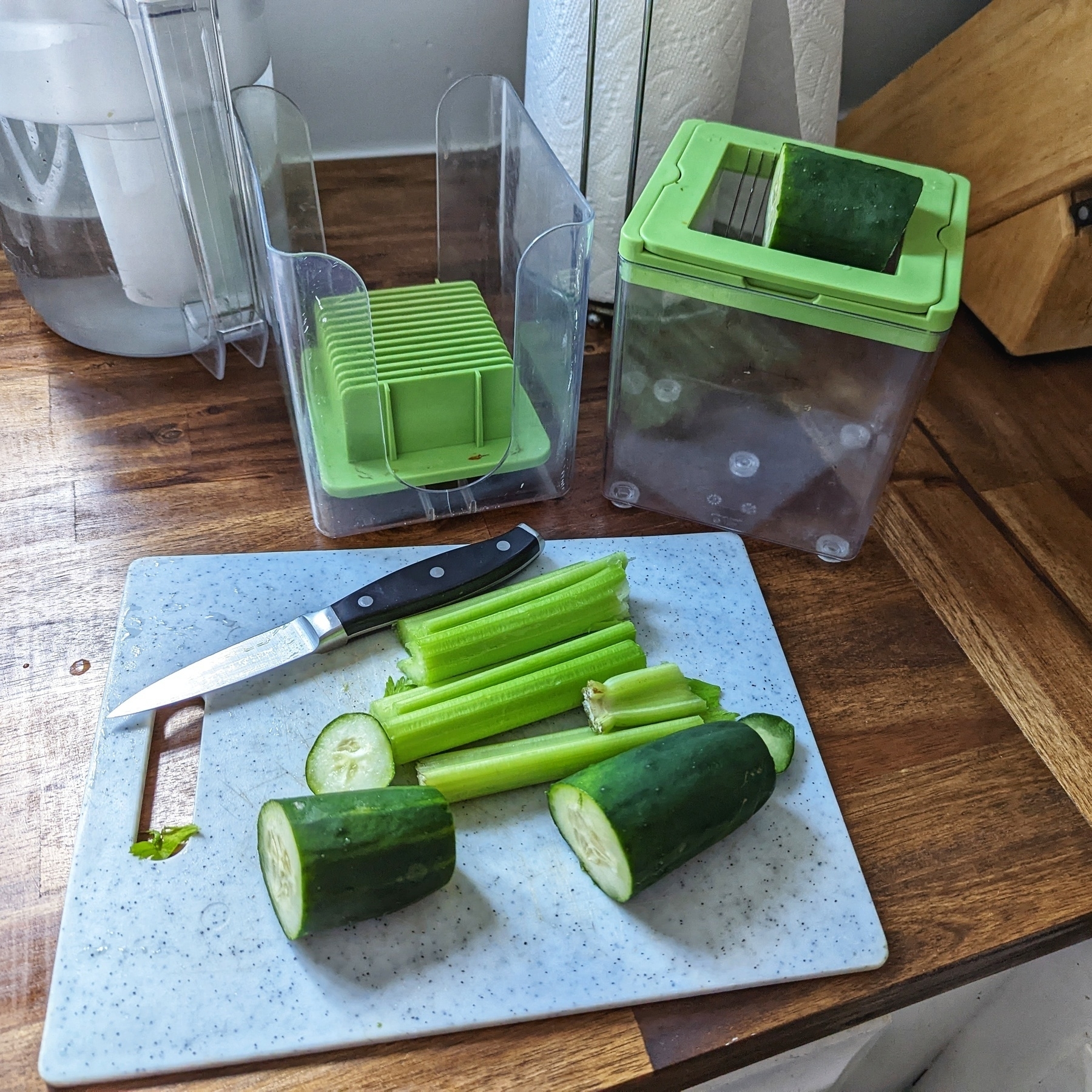
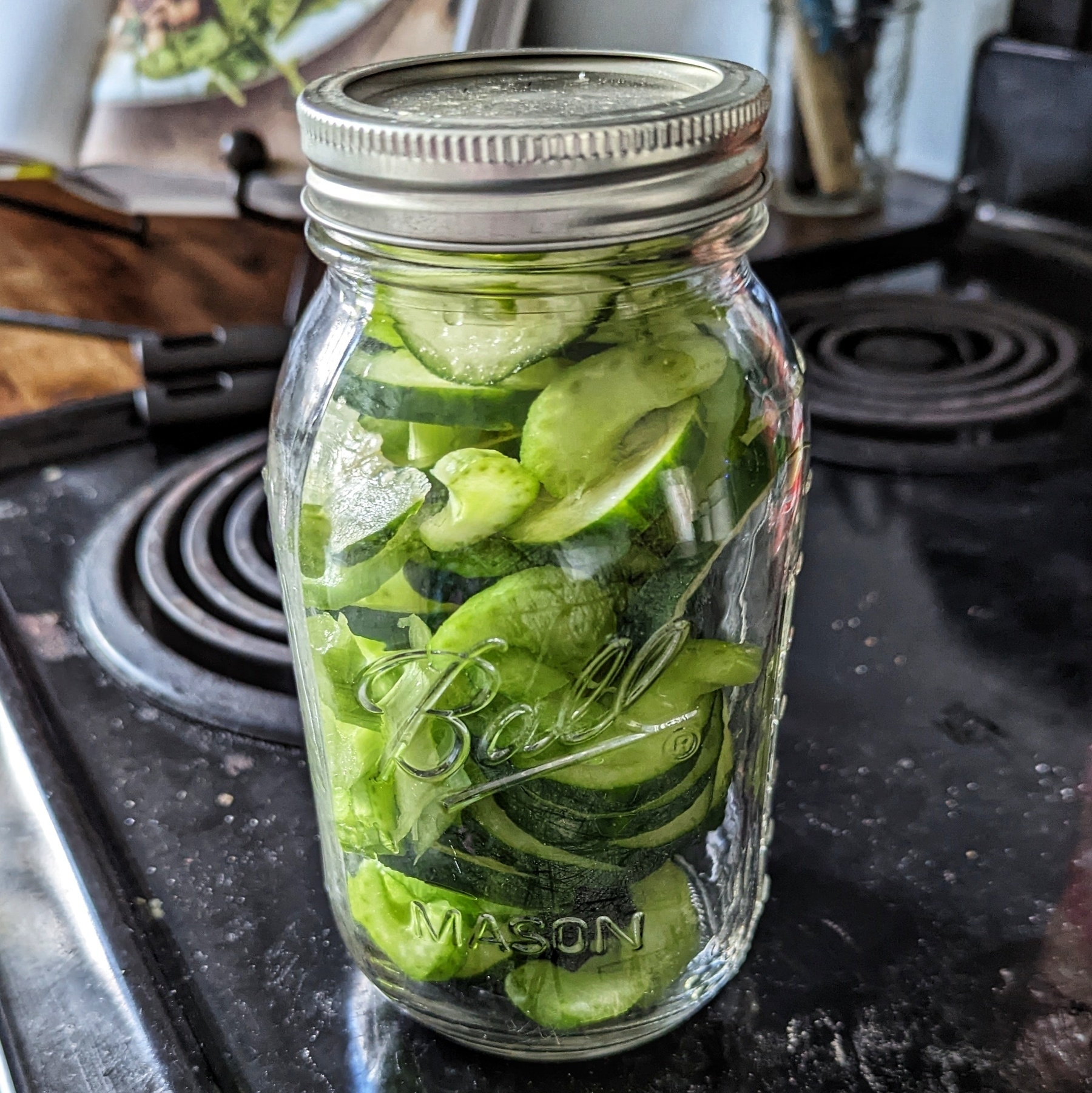
When it was time for lunch, I spooned a quarter of the beans into a bowl, then pulled some celery and cucumber out of the jar and stirred it all together. It was a lovely, easy lunch.
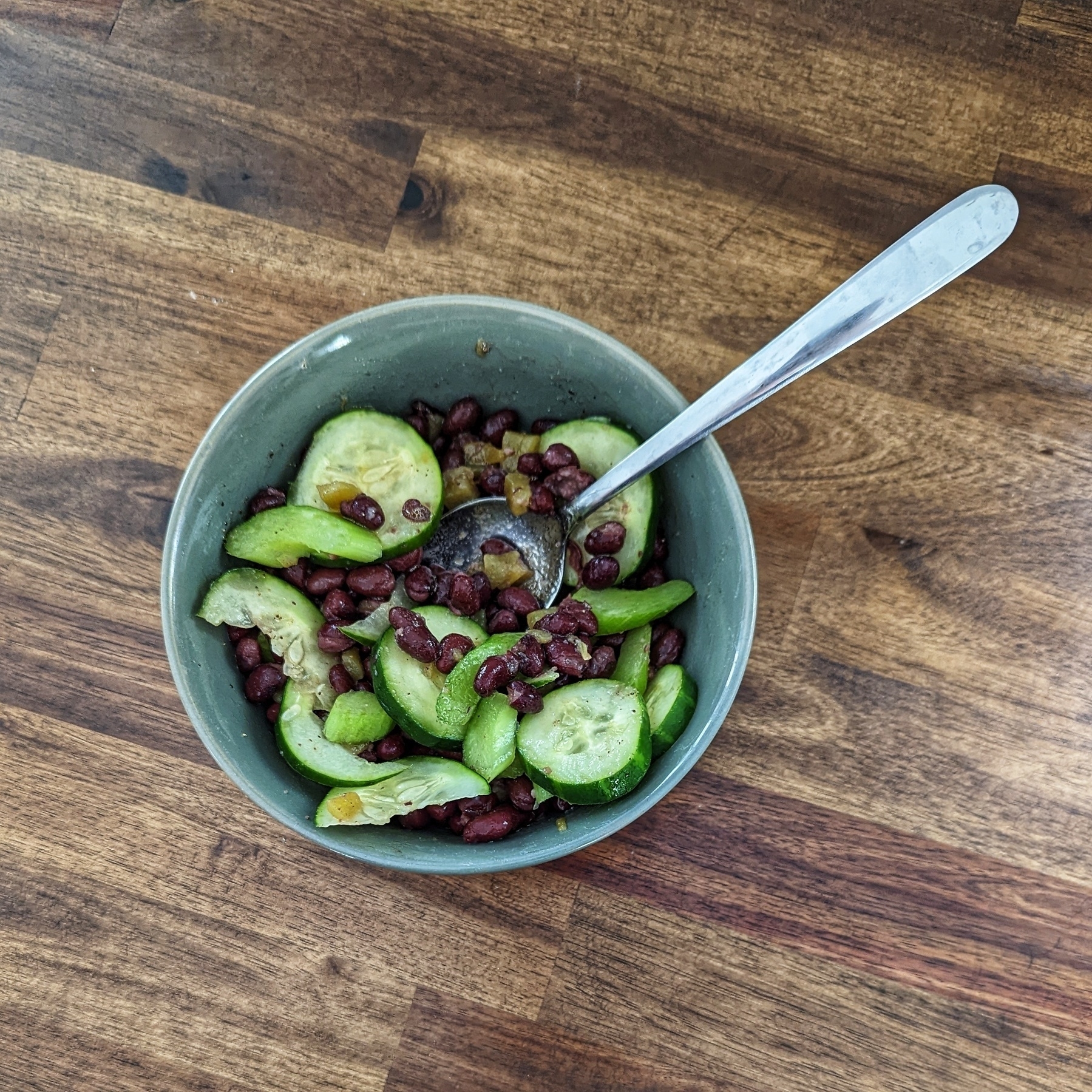
(The real star of this photo is my beautiful new kitchen counter.)
How to Scholar(?)
In my doctoral program, there was a class that we colloquially referred to as “babydocs.” As it was taught the year I took it, the purpose of babydocs was two-fold: 1. to introduce us to the field of library and information science and the variety of potential research areas and 2. to introduce us to the skills a person needs to be a scholar.
It’s been over seven years since I started babydocs and I’m still trying to get that “how to be a scholar” part down. Here are the topics and skills babydocs covered in this vein:
This was a two-semester course and that was only HALF of what we covered, with the other half being specific to our discipline.
I know how to do all of the things on this list, but I still haven’t created a cohesive framework or workflow that lets me do them in any but the most just-in-time manner. But a just-in-time scholar isn’t really the kind of scholar I want to be.
(And I do want to be a scholar, even though I’m not interested in tenure-track work.)
I share all of this because I’m going to try, all these years later, to create such a framework. Something that wasn’t part of babydocs.
I plan to blog about it and I thought y’all might like to follow along.
#FSNNA 22 Roundtable: Materiality & Liveness
Welcoming everyone to the session "Materiality & Liveness"
Talking about WWE and the impact of it being termed an "essential business" during COVID shutdowns
Professional wrestling bridges the gap between sports & entertainment
When both entertainment & sports were shut down, WWE was still available with both athletics and storytelling and thus the potential to appeal to fans of both sports and media.
Lucas's argument: WWE didn't have live audiences during shutdown like they usually do. They had to have a national audience to stay open for working, but only at facilities closed to the public.
WWE met both criteria when most other sports couldn't.
WWE moved toward "cinematic matches" - "like an extended version of a video game cutscene" - wrestlers in story-specific environment with editing, effects, and supernatural elements.
Playful Nostalgia: (Re)creating Video Game Spaces as Mods
Nostalgia for 3D platformer video games from the late 90s/early 00s like Super Mario 64, Sonic Adventure. Newer games are emulating (but not, y'know, ~emulating~) the older games.
Marketing and branding include a pitch toward nostalgia: "It's just like N64" "It's just like the Gamecube"
How do players take up this nostalgia themselves? For example, players create environments from old games in newer video games - e.g. creating an area from Super Mario Sunshine in A Hat in Time
We aren't limited to a single mod, so you could play in A Hat in Time, a Sonic Adventure level, with Sora from Kingdom Hearts as your player, riding a Kart from Mario Kart Double Dash.
Factors that influence textual meaning: paratexts, plays, fan-made histories, "mods as simulacra"
"Player-made mods construct nostalgia through remediation and play"
Talking about authorship in TRPGs (!!! calling @theroguesenna & @friede)
Looking at changes in D&D and other TRPGs related to race.
Summer 2021 was the #SummerofAabria when Abria Iyengar was guest DM on multiple actual play shows
AP has often been associated with the creation of a single DM but when Iyengar's work raised the question: how does authorship change when you have a guest DM? Who has authority?
Now notions of canonicity are taking root in actual play. How do TRPGs exist as both a transformative and an original work?
DMs like Iyengar can use their work to critique traditional depictions in fantasy.
The cultural afterlife of plastic toys and how they're curated and collected online now
Fans have to make consequential decisions about material objects (collectable toys) based on digital images
"attachments and affects can be complicated when realizing that what arrived in your mailbox was not exactly what you bought online"
Buyers read the materiality through images: What quality is the plastic? How much has it been damaged? Is it authentic? Is the blister packaging still attached?
During COVID, there's been a boom in the fan economy of vintage collecting.
A lot of collectors have liquidated their collections because they didn't have enough income during COVID.
The Japanese Yen to the dollar is at a 32 year low, so lots of Japanese collectors are liquidating them and selling to buyers overseas (mostly in America).
These collectors then only have immaterial access to their collections - images and memories.
There are important distinctions between player-made mods and official re-releases. There's more freedom to mix-and-match. Legality is an interesting question. Mods aren't strict emulations (in the code sense).
Court case in 2016 found you can't copyright ALL of a game. For example, you can't copyright game mechanics. Player-made mods do give players a sense of ownership.
People get introduced to older "texts" (video games) through these mods - e.g. you play an area in A Hat in Time, and decide to then go explore the game it's originally from.
Reproducing a cartridge like Limited Run games does introduces a new materiality that's different from mods. The gatekeepers are different: purchase vs. download from fansite.
Players of D&D often have a strong intertextual awareness before they even sit down at the table, usually have engaged deeply with fantasy through literature, film, video games.
There's often either a dissatisfaction with or true love of fantasy media that the player brings to the table and uses as inspiration for their character.
If the rules are dissatisfying/frustrating (e.g. I want to play as a dark elf and it's wrong of the rules to penalize me for that), this is where homebrew comes in. This leads to players & DMs bring worldview to the game.
based on personal experience, "play seems to become more valued as you have less recreational time." When work happens at home during lockdown, it can feel like all of life is work so
Additionally, the interpersonal aspect adds extra value. For example, RPing just hanging out in a pub became a fantasy it was valuable to play out.
Rules can give real-world obstacles a clear stat block and make it possible to fight these things in a really satisfying way.
Unlicensed toys also became part of the market and are often more highly valued by collectors than official, licensed ones.
#FSNNA22 Keynote: Turn On, Tune In, Get Out: Rethinking Escapism and Domestic Spectatorship
Beginning Turn On, Tune In, Get Out: Rethinking Escapism and Domestic Spectatorship
articulates the need for a theory of escapism, specifically as respite
has never felt the need to get out more than the past few years but where is there to go?
Theory: escapism as a spectatorial mode, one way viewers interpolate cultural objects
"Escapism is a desire that viewers bring to media irrespective of its genre, spectacle, exhibition context, or reception culture"
Viewers bring escapism, not vice versa.
Critics call things "escapist" when they think media's artistic merit doesn't align with its popularity
Escapism is frequently deployed in reference to media that has large fan communities
Historicizing the term "escapist," which was coined in the 1930s. (Benson-Allott is including a lot of detail so look out for her book on this topic later.)
"Escapism" is used both to argue that art should uphold morals AND that art doesn't need to engage with contemporary issues.
"Escapist" is used by critics to indicate a disconnect between a piece of art and themselves.
Previous work (by only 2 scholars) looks at escapism and whose pleasure is marginalized.
Others have focused on genre but not looked at how or why viewers engage in escapism.
As a viewer's sensibility changes, the viewer needs different escape.
If different types of movies can provide escape in a shared geocultural moment, then escapism can't be located in a particular piece of media or genre.
Escape from what? Not necessarily about a change of locale. "If it were, all fantasy films would supply escape to all viewers."
"Escape may be hard to achieve, but it is not site-specific."
Lots of talk here about how what we're escaping is being ourselves, which makes me think about the Daniel Tiger song: "You can change your hair or what you wear but no matter what you do, you're still you."
"Because pleasure is a process, it represents an escap-ing, rather than an escape."
"It cannot be an end, because it ends."
We can find escapism in media that acknowledges inequity and injustice.
"Desiring escape is not the same as desiring oblivion or obliviousness..."
Seriously this work is super rich and I can't possibly capture it all in a Twitter thread.
Escape as ex-cendance: getting out so you can go back
#FSNNA22 Live Blog: Fandom During/After Covid
Next session: Fandom During/After COVID
“Reaching Fans Through Deeper Interaction: The Case of Concerts Through Games and Interactive Spaces”
4 cases of concerts in games and interactive spaces: Fortnite is mostly a business approach.
Case 2: Adventure Quest 3D: Fan connection through gameplay
Porter Robinson: Secret Spy more about connecting fans through virtual spaces, chat, avatars, VR
Case 4: Concerts organized by Wave. Real-time motion capture. Trying to create interaction between artist and fans.
Key takeaways: new ways for fans to connect, artists found new ways to interact. "What is the impact of the fan persona?"
Talking about how stage musicals in China are thriving while Broadway is not - uses the closing of Phantom of the Opera on Broadway as an example.
First key to success is the introduction of the immersive theater genre. Special environments and audience participation.
Immersive theater's smaller audience size is good during pandemic
2nd key: Embracing idol fandom. Free drawing for idol performer cards. Exploiting fan labor for marketing.
Fan-made souvenirs, fan photography.
Key #3: Let's queer the theatres. All-male cast, cross-dressing, queer-baiting. These all appeal to female gaze. ([@KimberlyHirsh](https://micro.blog/KimberlyHirsh): How is Takarazuka doing? Could be a cool transnational study.)
"the pleasure obtained from face-to-face interaction is irreplaceable"
All previous Eva Liu tweets are from @EvaLiu1996
“Podficcing in the Pandemic” Key terms: Accessibility, Identity, Experience, Creating, Consuming, Socializing
Podfic is fanfiction recorded aloud and shared as audiopods online. Some people never thought of it as accessible while other people, esp with print disability, used it. ([@KimberlyHirsh](https://micro.blog/KimberlyHirsh): like fanfiction audiobooks)
Some fans used time they would otherwise have gone out to socialize to record podfic. Others experienced trauma and/or just felt pandemic didn't give them more time to create.
Listening to human voices made people feel less alone, but people who lost their commute or had more other people at home listened to less podfic.
Podfic community was an important social activity for some participants.
“‘Are We Friends or Opponents?’ Fans’ Relationship Changes from Online To Offline” with Yuhang Zheng
In idol fans pre-COVID there was a hierarchy where offline fans were considered "core fans" and online fans were more peripheral, but as idols moved activities online during COVID-19, this dynamic changed.
More affordable to attend signings, don't have to navigate physical distance
Change of fan space made it more equitable, less hierarchical. Will the old patterns resurface? How do these patterns work in fandoms surrounding fictional works/characters?
with Dina Rasolofoarison: “Where Is roundtables Fandom Acted Out in 2022? An Update on Places of Fan Practices”
inclusive definition of fandom - not just cult media, but specific nations/cultures, cooking, and more
2 dimensions of places: 1. places have functions, 2. places of substitute consumption - driven by restrictions of time, money, or place
There's lots of great conversation happening in this session but I got distracted and am a little overwhelmed, sorry.
Eva talked about my question about Takarazuka, pointing out that while Takarazuka (Japanese all-women musical theater) has a strict division between otokoyaku (performers who always play men) and musumeyaku (performers who always play women) 1/2
...Chinese and South Korean immersive theaters that feature all-male casts might have a performer play a man in one production and a woman in another.
#FSNNA2022 Live Blog: The New Bedroom Cultures
introducing the panel "The New Bedroom Cultures"
“The Growth of Fangirls and Fanfiction During the COVID-19 Lockdown” "A bit of an accidental autoethnographic activity"
Dissertation focused on Harley Quinn and her relationship with her fangirls. Argued that Harley moved from sexualized object of the male gaze to reclaimed character, and credits fanfiction with this move.
Interested in the transition of fans from producers to consumers.
Fell down a fanfiction rabbithole on TikTok.
Sociology theory about bedroom culture highlights bedroom as a sacred space for adolescent girls, originally considered bedroom as consumer space but more recent scholarship argues that bedroom culture includes production
The transition from consumer to producer was pressurized during lockdown, which led to a boom of fan engagement.
Discusses fannish bedroom cultures during the lockdown, fanfiction as a bedroom ritual. Presentation draws on interviews conducted during Master's.
Title of talk is “A Fandom of One’s Own: Fanfiction as a Bedroom Ritual During COVID-19”
Fanfiction is defined by intimacy, both in its topics and in the spaces it exists in.
Participants could personalize emotion via tags: hurt/comfort, enemies-to-loves, fluff...
"reception on a loop" You experience the original media, seek out fan-created media, engage in fan practices regularly, which drives you to seek out the next piece of new media.
Reading fanfiction is a personal ritual, "alone time"
Socialization in digital spaces allowed fans to maintain kinship and community.
notes that @andolfi_lea mentioned parasocial relationships which probably all of them have something to say about
Dr. Welsh-Burke's talk is “‘I Am on My KNEES’: TikTok as a New Site of Adolescent Sexual Desire”
looking at experience of female fans as producers and fans
Noticed enthusiastic display of sexual desire in caption of fan vid on TikTok, liked it and started to get more recs for things where people have "extreme affective responses"
This content on TikTok was a positive reclamation of the stereotype of fangirls as only interested in certain topics (e.g. sexy topics)
TikTok is an especially bedroom-y media space in terms of both creation and consumption.
presenting “Bedroom Cultures but Make It Enby Cottage Core: Reading Shakespeare as a Disabled Trans Fan”
warning: going to discuss bigotry, esp. transphobia, and safety
Discussing reading Shakespeare's "As You Like It" as a trans text. Rosalind & Celia live a queer-utopian cottagecore life in the Forest of Arden.
IRL when marginalized people meet each other it's not always self. There's bigotry related to different combos of marginalization.
In The Forest of Arden, it feels as if everyone is safe.
"If all those queer people running around in the forest are the monsters, then we have nothing to fear. Everyone is safe."
In the Forest of Arden, "everyone is always possibly polyamorous." It's bittersweet to contrast this with spaces in real life.
This contrast is more pronounced when the person doing the looking/reading is trans & disabled.
Anecdote about harassment at a coffee shop that ended with Dean feeling the owners of the shop would blame Dean for being a magnet for harassment if a similar incident happened again.
The "depressing, gray" bedroom experience is attractive because there aren't a lot of people that can harass you there.
There's an interesting relationship between trans' people's experience of being expected not to even exist outside and these fantasies of the cottagecore forest (and other safe spaces) inside.
In some fandoms, e.g. superhero and Star Wars, other people in fandoms perceive the source material as "serious" and were worried fangirls would "drag it down" because fangirls are interested in "silly things"
The discussion is getting really good but I'm struggling to keep up with tweets, sorry!
Saw Twitter thread about how there used to be no women in nerdy spaces and, of course, there were and many people argued against OP but sadly lots of people were also agreeing.
There's a similar phenomenon where people claim there weren't trans people in fan spaces in the past, which is patently untrue.
"It's interesting to think about the multiplicities of bedroom cultures that are getting made" - referring to a statement @DeanLeetal made about how different people need different forms of escape.
We need art of everyone in their own bedrooms engaging with their own bedroom cultures.
Creator of that original video on TikTok shut down their account. This leads to loss of a lot of born-digital stuff that it would be good to capture for methodology. (Come to our #FanLIS session and talk to us about born-digital preservation!)
As fans we have to do that work of archiving. ([@KimberlyHirsh](https://micro.blog/KimberlyHirsh): shout-out to @De_Kosnik's book Rogue Archives)
It's also an ethical question - if we've preserved something, do we keep studying it even after the creator has taken it down?
When fanfiction is brought up to creators/actors, it's often in a degrading way.
There's also an issue of consent with actors, who might not want to hear about what their characters get up to in fanfiction.
In chat, Erin Lee Mock points out "For many people, COVID lockdown was not an experience of isolation, but of greater carework obligations, etc. Is there space within discussion of "bedroom cultures" for these individuals, especially as relates to fan production?"
Talking about how even as teens, girls often have more caregiving responsibilities so in that sense bedroom cultures still works.
Points out that home is not always a safe space, especially for multiply marginalized people.
Luisa de Mesquita asks "I was wondering if there are any significant differences in engagement with fandom and fannish practices between those who were already 'established' fans and those who became fans during the pandemic?"
speculating that it will vary - some people will have come to fandom during the pandemic and stay in it for life, but others as they are less isolated will engage with fandom less
Kirsten Crowe asks "I wonder about the experience of college aged people returning to their childhood bedrooms and how that shaped fannish experiences in terms of bedroom culture during the pandemic"
Yes, thanks to pandemic I finished my MSc in my childhood bedroom, will finish my PhD in childhood bedroom, doing this from childhood bedroom 😄
That last tweet should've been from @SandbachElise.
It's really interesting to return to your childhood bedroom and engage with fandom on a new platform when you engaged with fandom there years ago.
It's interesting to note that we're in our bedrooms studying other people in their bedrooms.
A hike at Eno River State Park
Yesterday, W, M, my sister ME, and I went for a little hike at the Eno River State Park. I’d planned a little flat loop, but we didn’t know which access to use to get to it. We ended up at the Few’s Ford access and just walked the closest trail to where we parked, which turned out to be the Buckquarter Creek Trail.
We happened upon some folks from the Eno River Association, who had set up a tent, nets and water shoes, and little bins with water in them so people could catch little water animals and learn about them. It was a beautiful serendipitous occurrence and we had nowhere to be, so we stopped to join in. M found some water striders and a snail.
After they packed up, we continued down the trail, then stopped for a break so M could play on the rocks and fallen logs. While he was doing that, a great blue heron landed a ways from us. We watched it stretch its neck down to the water, then pull its neck upright. It was huge. Eventually it flew from one side of us to the other. Its wingspan was incredible. It’s a majestic bird.
Eventually, a tree wobbled under M and he fell in the water. We didn’t have a change of clothes, so we ended our break and started walking again. We made our way to the pedestrian bridge. It was a suspension bridge, and walking across it gave me a bit of vertigo. We continued on the other side of the river, then crossed the river on rocks when I heard a family ahead of us talking about an animal on the ground. I thought it might be a snake and W hates snakes, so we went ahead and crossed.
We finished up the trail and came home for a late lunch from Domino’s.
This was a super successful adventure, so I think we’ll try a hike every weekend while the weather is favorable.
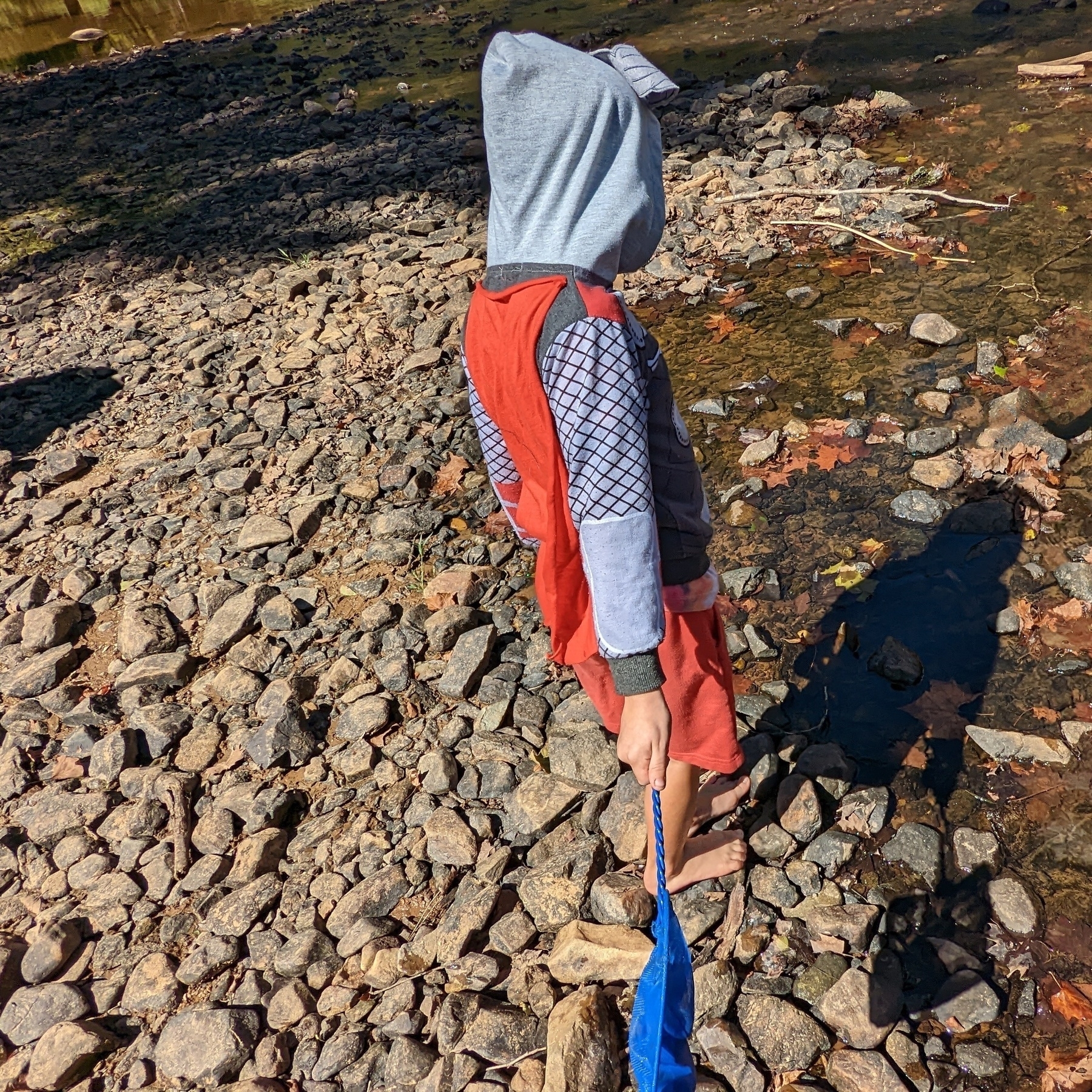
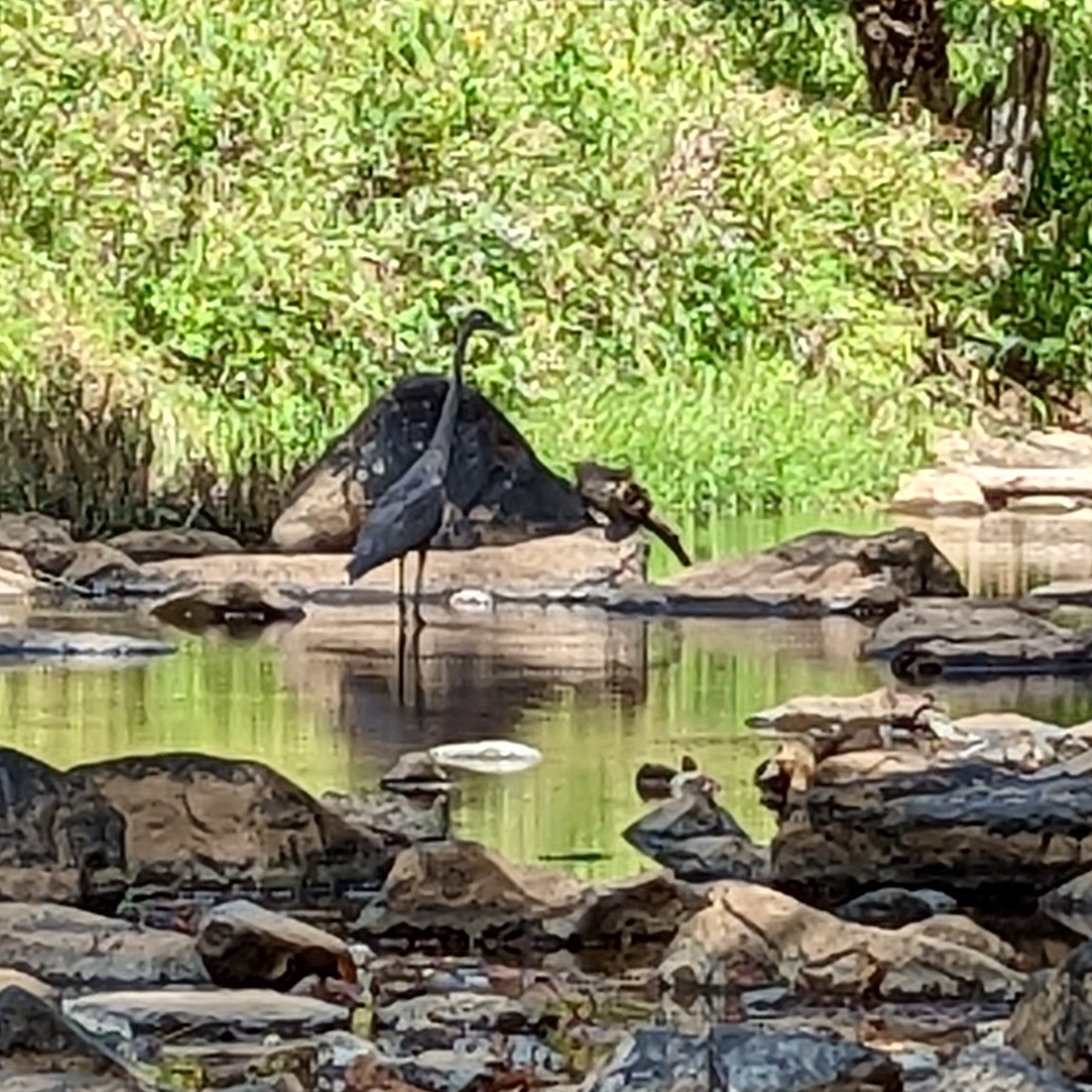

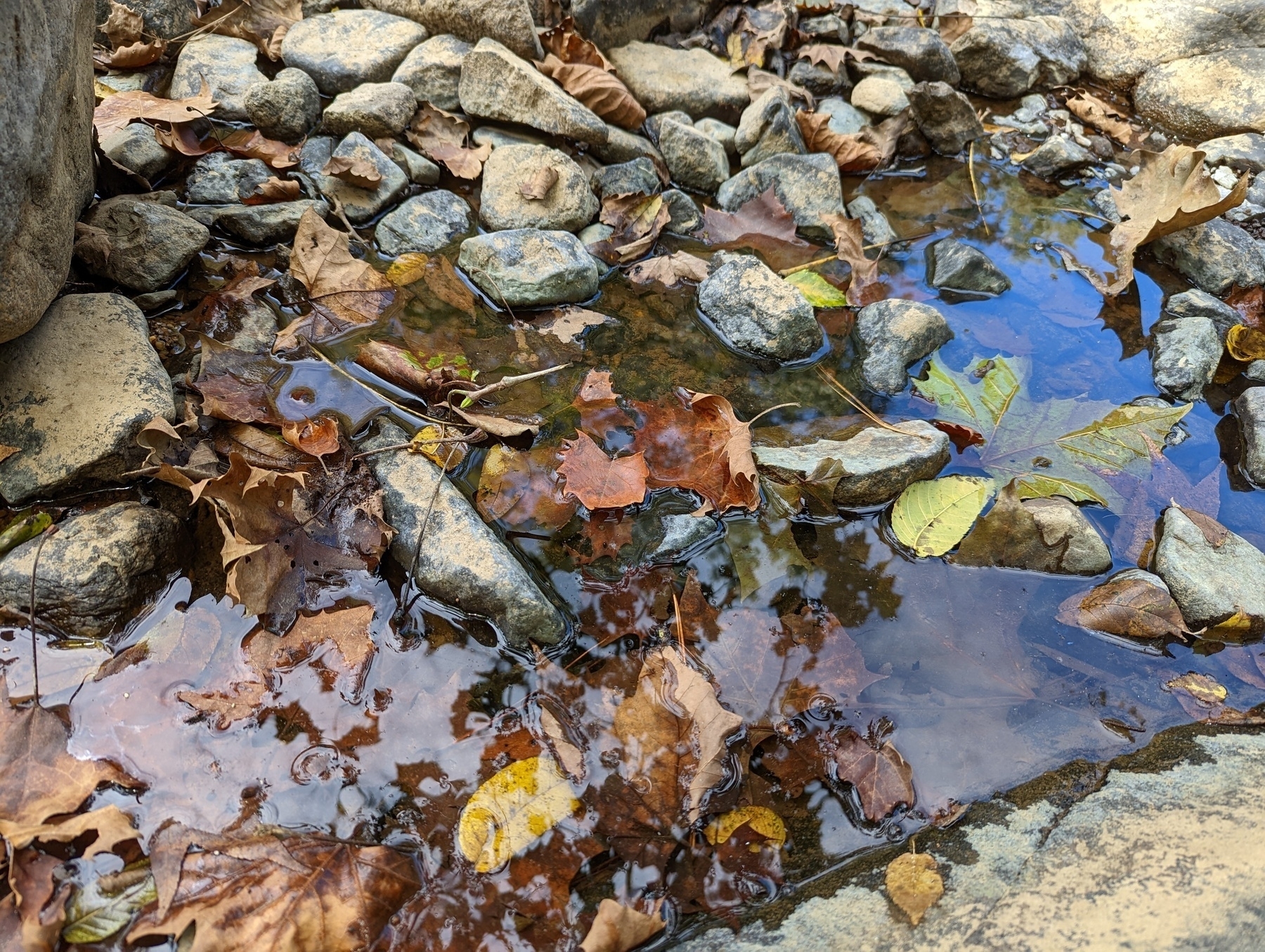
When my brain won't read 📚
I hate when my brain won’t read, which it won’t today. Reading is my core way of interfacing with the world. The tools we use shape our thought processes, and writing and reading have been my primary tools since I was a small child. Reading heals me, distracts me from pain, comforts me when I’m lonely, and gives me new ways of thinking.
I know this inability to turn other people’s words into things that cohere for me will pass. And I can do audiobooks some. But there’s also something about the physicality of reading that I miss when I do that. So it is a great companion to reading text, especially for times it’s not smart to focus on texts like when I’m driving or trying to fall asleep.
Maybe I’ll try reading something middle grade instead of YA or adult and see if that helps.
Day 3, #TheSealeyChallenge, Rose, Li-Young Lee 📚
This is a gorgeous book, full of grief and beauty.
Selected quotes:
Water
In water
my sister is no longer
lonely. Her right leg is crooked and smaller
than her left, but she swims straight.
Her whole body is a glimmering fish.
Eating Alone
White rice steaming, almost done. Sweet green peas > fried in onions. Shrimp braised in sesame
oil and garlic. And my own loneliness.
What more could I, a young man, want.
Visions and Interpretations
Truth is, I’ve not seen my father
since he died, and, no, the dead
do not walk arm in arm with me.
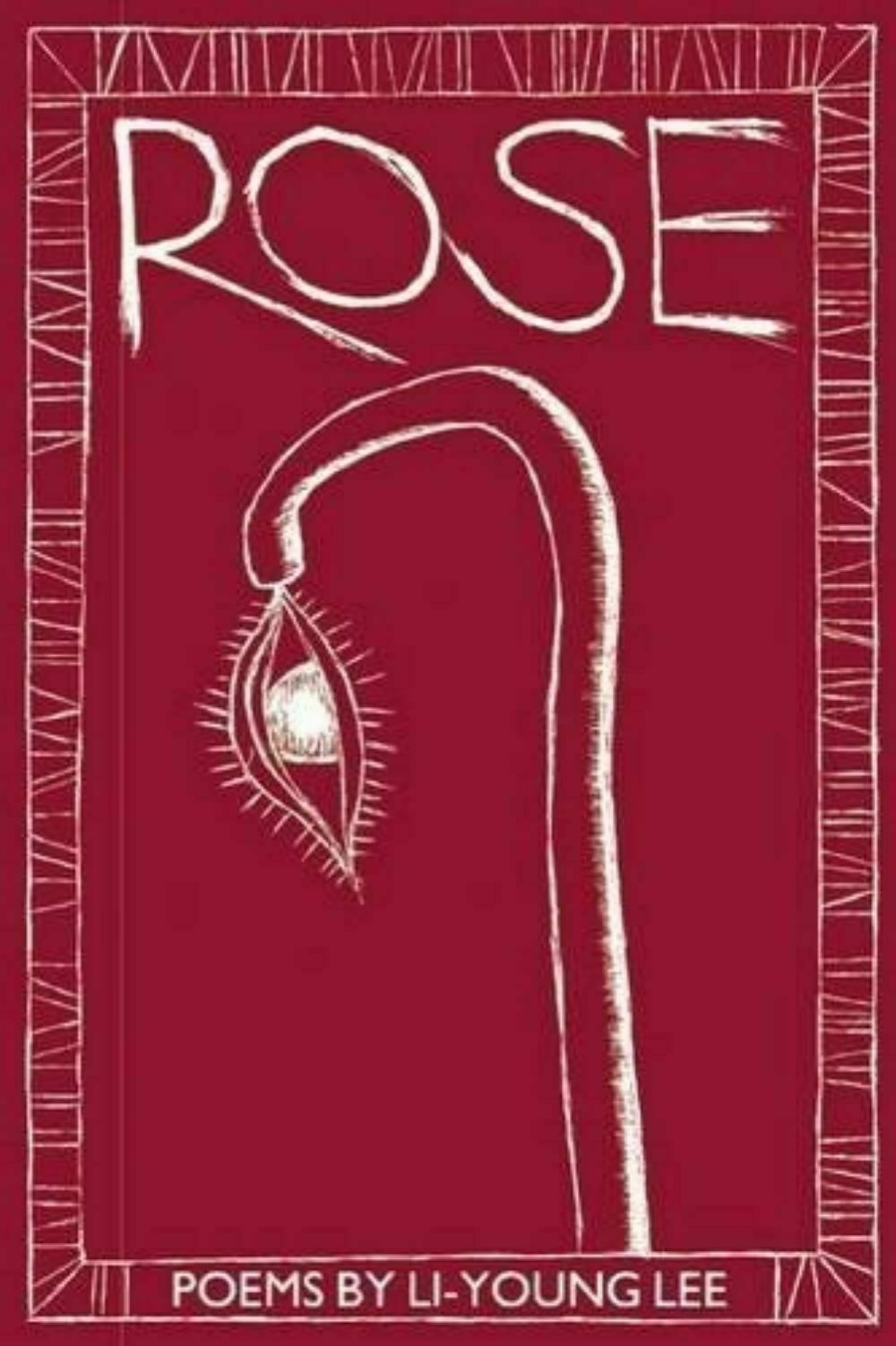
Day 2 #TheSealeyChallenge, Leaves of Grass Book I: Inscriptions, Walt Whitman 📚
Selected quotes:
Eidolons
We seeming solid wealth, strength, beauty build,
But really build eidolons.
To the States
…Resist much, obey little
Thou Reader
Thou reader throbbest life and pride and love the same as I,
Therefore for thee the following chants.
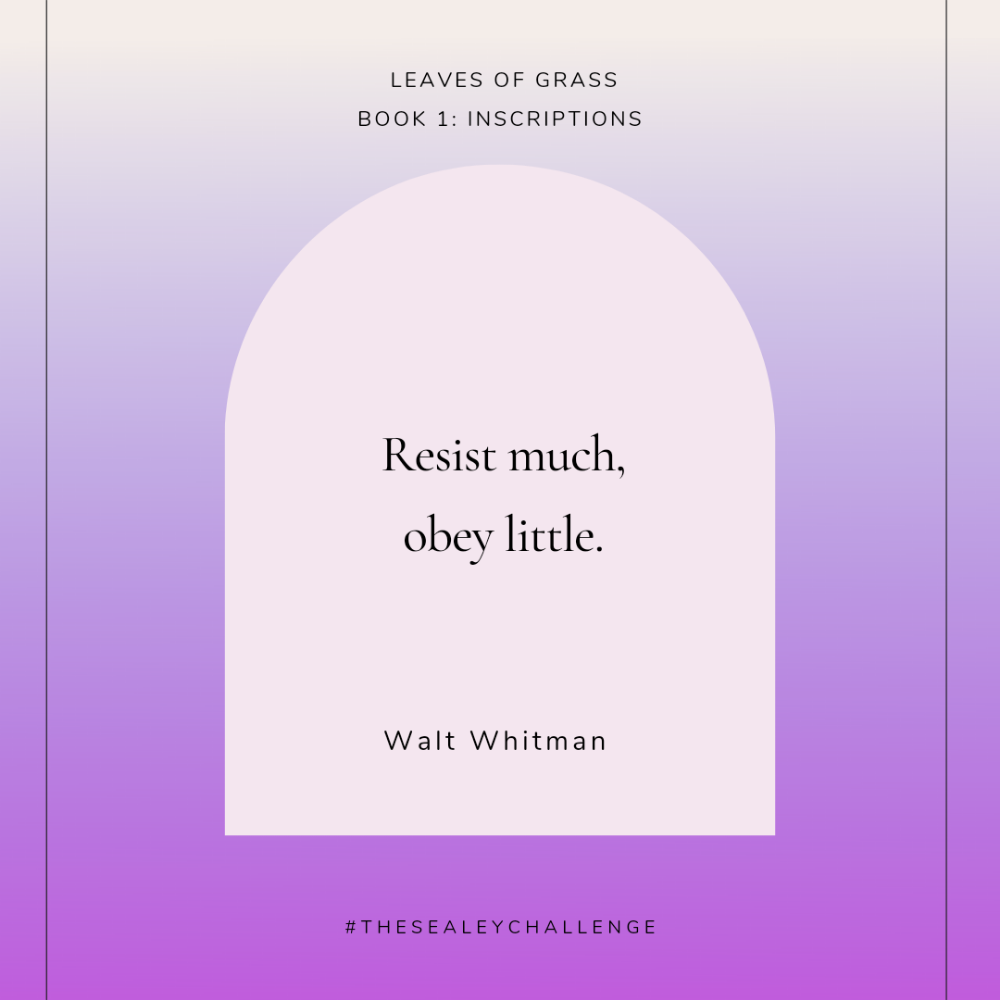
Day 1 #TheSealeyChallenge, Fieldnotes on Ordinary Love, Keith S. Wilson 📚
Selected quotes:
6:45 pm
…God, it’s pretty.
But what does any of it mean?
A Unified Theory
You think, what if I am stuck like this? What if
I never change? So what.
Never change.
Moments are not for revision—
if they are lived honestly, they are open to one interpretation.
only. They make you like a child.
Of course that’s what they make.
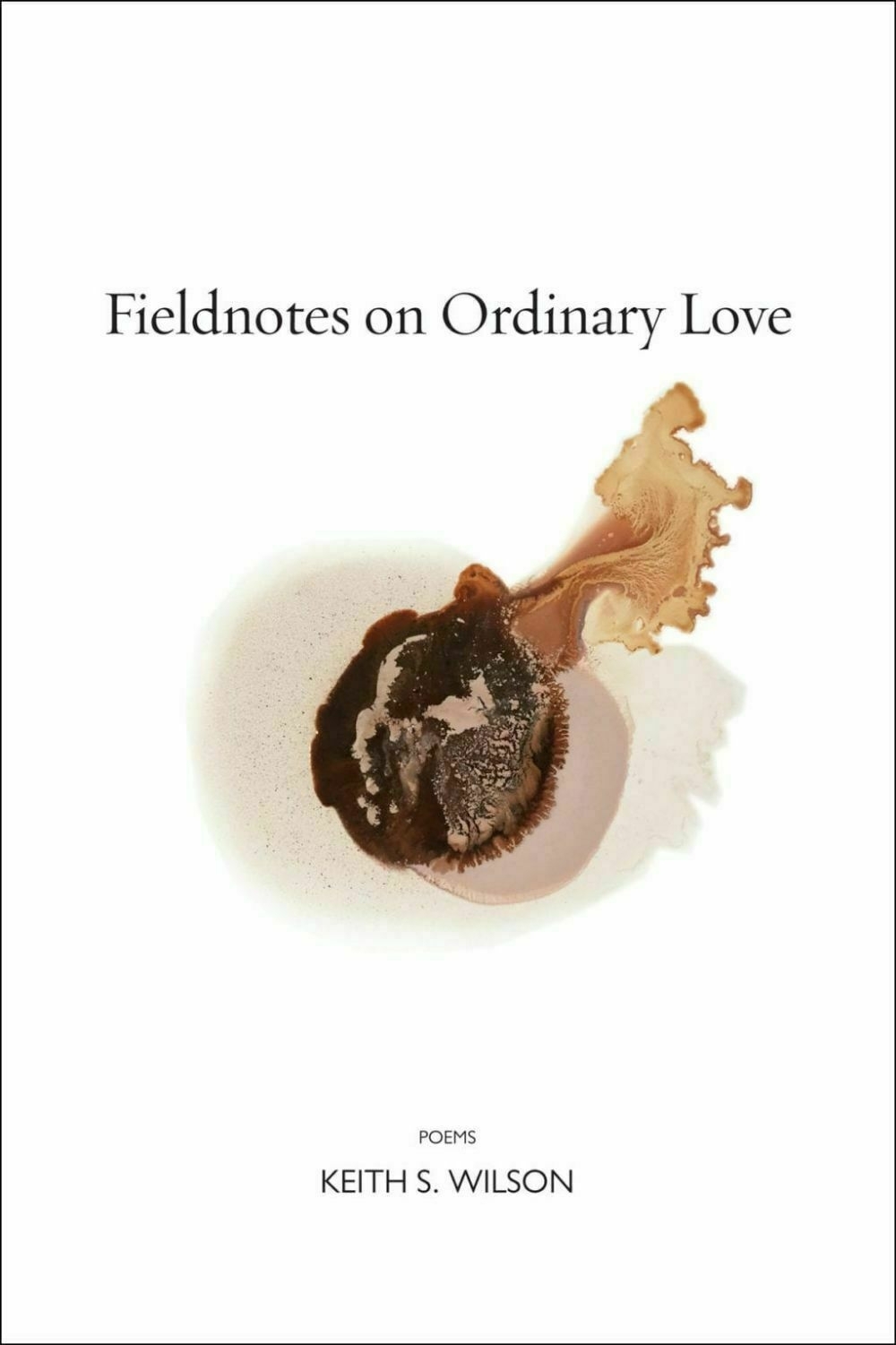
#CLS2022: Creating Equitable and Inclusive Library Spaces in the Face of Obstacles
I didn’t get to liveblog/tweet this session because I was co-facilitating it, but I’m jotting down a few takeaways and a list of resources/links in hopes they will be of use to folks.
Our panelists were:
We opened by asking the panelists to share their broad perspectives on creating equitable and inclusive library perspectives.
Connected Learning Lab Senior Research Manager Amanda Wortman took awesome notes on these. Here are some big ideas:
We then launched into some questions based on our work in the Transforming Teen Services for Equity, Diversity, and Inclusion project. I basically acted as a clueless, well-intentioned librarian asking for help.
How do I know if I’m actually creating an inclusive space?
You might not be able to tell, but if your love for the work shines through, you’re moving in the right direction. When your space starts to feel like a living room and a community hub, keep doing what you’re doing and grow more in the same vein. Look at yourself and your colleagues; what unstated or invisible expectations are you communicating? They might be making the space less inclusive.
I think I’m creating inclusive spaces but people aren’t actually coming into them. What should I do?
LEAVE THE BUILDING. There are a lot of reasons people might not come. Go to where they already are. Consider not just your own actions, but those of your colleagues. Are other people in the space making it less equitable and inclusive? Build authentic relationships, in or out of the library. The relationship with the person is more important than the presence of the physical space. Change the power structures in the space; design with youth rather than for them.
I know I need to leave the building but I’m overwhelmed. How do I start?
You start by starting. Team up with a friend. Build on the work of a colleague near or far who has already gone out; learn from their experiences. Don’t stop going out after one attempt doesn’t work. Move on to the next potential place or partner. Keep trying. You’ll eventually find the right fit.
Okay I’m ready! But I talked to my supervisor and they said I can’t leave the building. What’s my next step?
Relationships are important here, too. Build a relationship with your supervisor. Help them understand the value of the work you’re doing and why it’s important to go into the community. Write a formal proposal for the supervisor. Include outcomes and impact. Make it clear it won’t take you out of the building for a whole day at a time.
How can school and public librarians think beyond just going into each others’ spaces? How can we get to places that don’t have library or school vibes?
Go to where they spend time outside of school. If you’re partnering with a school, think about going to extracurricular events that don’t feel so formal and school-y. Recognize that what matters most is that youth get what they need, not who provides it or where.
I want to learn more! What should I do next?
Links
My Notes from #CLS2022: OPENING PLENARY - Staying Connected, Fueling Innovation, Affirming Core Values: Three Learning Organizations Carrying Lessons Forward from the Twin Pandemics
Getting today's plenary started - Staying Connected, Fueling Innovation, Affirming Core Values: Three Learning Organizations Carrying Lessons Forward from the Twin Pandemics
is moderator, beginning the panel. Talking about carrying forward lessons from pandemic crisis into "neverending pandemic."
invites attendees to share something good that came out of the pandemic for them. There are too many to share all here! But big themes are family time, taking breaks, conversations about accessibility.
Jessica, let's start with you. We think of a library as a physical space where people go. What happened with your library during the pandemic? What can other people, in a library or otherwise, learn from your experiences?
works with Cloud901, a teen learning lab in Memphis Public Libraries, work with STEM/STEAM, project-based learning, and connected learning.
Closed for about a month, partnered with other city divisions & community organizations. Metropolitan Interfaith Association - library staff boxed food, were drivers, were able to get into community with access to library materials, worked with p
Worked with Parks & Rec and other divisions to disseminate information about social services. A great opportunity to get out and reach out to communities who were underserved or couldn't readily come to the library.
Previously divisions were siloed but now they can connect to serve the community.
Shifted to online programming. With that program, they touched people in communities across the country, not just Memphis.
Able to work with people who wouldn't normally come to the library for a myriad of reasons - anxiety in social settings, other reasons - able to access library programming at a comfort level that worked best for them.
A lot more families at online programming. A lot of parents working alongside kids during camps. Opportunity for family to get together & bond and parents became library advocates.
Understanding & seeing that library staff need to recognize in every aspect where barriers are, even when we don't readily see them.
Online programming was wonderful, but what about people without home internet? What about requiring supplies for a program?
What barriers are out there? How can we break those down? Wifi hot spots, takeaway supplies. Producing programs that only use things readily available at home or brick & mortar store.
With population 30-40% below the poverty line, people have to choose - do they send their kids to an enrichment opportunity, or do they feed them?
Really promising: holistic vision of youth & families & what they need. Intersection of innovation and equity. "We can't do this for everybody, so we're not going to do it at all." So iterate to make it accessible for more people.
runs a clubhouse that had to move online. It was a challenge. Hearing some commonalities between ListoAmerica, an afterschool program that serves primarily Mexican community, and library already.
ListoAmerica is part of The Computer Clubhouse, a network. Had to shut down physical space, but within about 2 - 3 weeks, UCI PhDs were able to support creating the clubhouse online for the same hours online.
Tried to replicate as much as possible the pre-pandemic experience but had to be innovative. Started member-to-member meetups because new members would be isolated.
Members are youth. Usually middle school & high school. Connected new members with mentors.
Created hybrid programs. Created pick-up point for materials to pick up at one time and conduct sessions later on.
People would make themselves available in online community at specific time so other people could come discuss with them.
Temptation is to just learn the technology and gain skills, but goal of ListoAmerica is to support creation, not just skill building. Connect people with interests - for example music-interested youth and video-interested youth collaborate on music video.
Mexican culture is important. Mentors were almost all Mexican. Mexican American members often had parents who were undocumented and thus didn't want to come in. Mentor created entire Discord channel in Spanish and invite family members in.
works in Tacoma school district in Washington State. Fortunate to have a school board and superintendent who embraced pandemic as a community with grace and empathy.
In March 2020 decided to be as pro-active as possible. Set up design around an online school that they expected to have about 400 kids, ended up with about 5000 out of 30000 who wanted an online experience.
over 250 staff members, community eager to keep students safe in the online world. Quickly shifted gears into evolving into high quality. It was difficult because staff hadn't been trained in online teaching.
Grace for staff and students formed a community. While other districts are sprinting back to "normal," Tacoma has moved toward redefining and reimagining new normal.
Online school is now a fully-functional school with about 2000 students. Tacoma is also introducing a flex program to allow students to experience both face-to-face and online learning, which allows flexibility in their schedules.
Tacoma's been working on a whole student initiative and this moved them toward a whole community perspective.
When is an online environment better than an in-person environment? When is it a weak facsimile of a personal environment?
Didn't think online clubhouse would work, for example "creative collision" in small space where people would bump into each other and notice each others' work and ask about it.
Somehow, with the hybrid model, it worked. Occasionally, we would get together in very careful (socially distanced, masked) groups, and were able to go global. Connected with clubhouse in Mexico City. Never were able to do that before.
That enhanced the cultural background, that it's okay to be Mexican in the United States, it's something to be proud of. Opened Mexican American citizens' eyes to what it's like to be in Mexico and what technology is like there.
Able to connect online with people from all over. Were able to ask colleges to send virtual tours for them to share with people who couldn't travel to visit.
This summer, they started back in person with summer camp. Every camp this year people have come back with people they met in camp and they've continued to work together. This didn't happen before.
It's a "Yes, and." Redefined understanding of connected. Multitiered opportunities to connect with adult learners, assessing online experiences combined with occasional face-to-face meetings led to some simple tech innovation.
Kindergarteners took a field trip to the zoo, some in person, but many remotely who were working in teams and engaging during chat because the schools had taught that school. Recorded the session and now it can be reused with different groups.
Online learning is not the best path for every kid, but it very well could be for some.
Teachers were not only livecasting, but were interacting with students online. Students could see their own teacher.
Was the number of participants the same, larger, smaller, different people in online programs versus face to face?
Old members already had established connections. New members would introduce themselves and old members would connect with them.
Scale expanded going remotely. The question now is should we go back to some form of physical?
It depended on the program. Camps were larger than we anticipated. Some other programs like college virtual tours were huge numbers. Some programs just had 2 to 3 people in them. We counted it as a win whatever it was.
Club and extended learning opportunities tended to grow online.
Transitioning to online was already a struggle, so any number of kids we counted as a win.
We've gone back to in-person but there will always be some kind of hybrid component to a good bit of our programs.
We didn't have multiple-hour programs. They were very short, intensive. We would talk, but the staff made a lot of video work that youth could not only watch, but reference.
Having videos to reference helped kids who fell behind or missed sessions. We shared it with other library systems in Tennessee.
Have there been opportunities to connect and collaborate with parents and other community organizations?
We had existing partnerships and it was exciting to see those partners pivot with us.
One thing that's worked for us is other non-profit engagement. We got a call from an organization in another county that wants to open up a clubhouse and a remote clubhouse working with us.
Final thoughts?
What we have found is that for us, there's no "getting back to normal." There's working to address the shift in our youth. We've seen a number of youth ask for programming and services around mental health, being engaged with social & economic issues.
We're shifting and rebuilding in some areas with how we continue to service our youth. What we did before for branding & strategic planning can stay in place but we recognize that the way we were doing it needs to shift.
A young lady who started with us in middle school and is now at Cal State University Fullerton, whose world was a 2-mile radius when she started with us, now has a global perspective and spent a semester in South Korea.
It's a vulnerable celebration of acknowledging that we don't know what we don't know. Adam Grant: "We live in a rapidly changing world where we need to spend as much time rethinking as we do thinking."
Deciding when to drop a paper: Rethinking my lit review about tabletop RPGs and identity development
I’ve been sitting on a paper that was “accepted with revisions” for more than 3 years. I have poked at it sometimes and worked hard on it others, sometimes hated the revision process and sometimes enjoyed it.
The purpose of submitting this paper was not actually to get it published. It was to get it submitted so I met the requirement of having submitted 2 items for peer review before my comps. Also, it’s not original research. It’s a literature review.
My assistantships in my first 4 years of the PhD put me in a situation where my colleagues and I weren’t publishing much in scholarly journals. The first year, I helped with a lit review that I think was for a popular publication. The next three years, I worked on an immense professional development project. I’m very proud of the curriculum we created and did get some trade publication out of that but again, not scholarly publication.
So it wasn’t until my last 2 years of my PhD that I was working with other scholars on papers, most of which are currently in submission or revision. All my work for scholarly publication before that had to be solo-authored and, quite frankly, what I wrote was Not Good. It wasn’t BAD but it needed so much revision.
By the time this accepted-with-revisions lit review came back to me from the journal (it had gone to a third reviewer because one reviewer was like “Accept! Minimal revisions!” and one was like “R&R… Maybe.” Reviewer 3 basically said “Accept but with heavy revision”), I was 3 years out from the original class paper it was based on. I had barely rewritten it from that for submission because, again, I just needed to move past a PhD milestone.
I was very excited when it came back accepted with revisions, but I was also in the middle of a very stressful house-buying process, writing my comps, and only had half-time childcare, so I couldn’t make it a priority.
Also I was, understandably, hurt by some of Reviewer 2’s pointed and accurate statements, so I set it aside for a while.
I picked it back up and made a revision plan, drawing on Wendy Belcher and Raul Pacheco-Vega’s advice on how to deal with revisions but as I sorted through these changes, I began to realize that NONE of them were small. They were all large changes. Here’s the kind of thing I mean:
This is daunting as all get out, especially alone, especially when dissertating AND working (because I didn’t have a dissertation fellowship, I was also conducting research and writing as part of an assistantship my final year), and there’s a pandemic on (that wasn’t until a year after the paper was “accepted” but still) and you’re a parent of a young child and you have limited childcare.
But y’all, the shame I placed on myself for not revising this paper.
I’m absolutely still excited by the central ideas of this paper:
But oh my goodness I do not want to work on this paper anymore. This iteration of this set of ideas does not bring me joy.
And after yesterday’s Connected Learning Summit panel on post-pandemic burnout with multiple panelists talking about the importance of centering work that feeds and serves you, I am ready to let go of tinkering with this six-year-old literature review for publication in a journal that honestly deserves a more insightful set of arguments around these ideas.
On the other hand, I’ve worked hard on this thing for a few years and don’t want it to sit in my Google Drive collecting dust and being of no use to other people. And my colleague Maria Alberto said it was “absolutely interesting and useful.”
So I’m going to read through it one more time and make sure it makes sense, and then I’m going to publish it effectively as a pre-print/author paper here on my website and in a couple of pre-print archives as well, so it can get out there as it is.
THEN I’m going to do two more things with it:
Huge thanks to Sandra Hughes-Hassell for her feedback on this, the folks at JRLYA who gave me feedback, and Maria for validating me. Also to Katy Rose Guest Pryal for her advice on how to deal with research in The Freelance Academic, and yesterday’s panelists for talking about doing research that resonates with your soul.